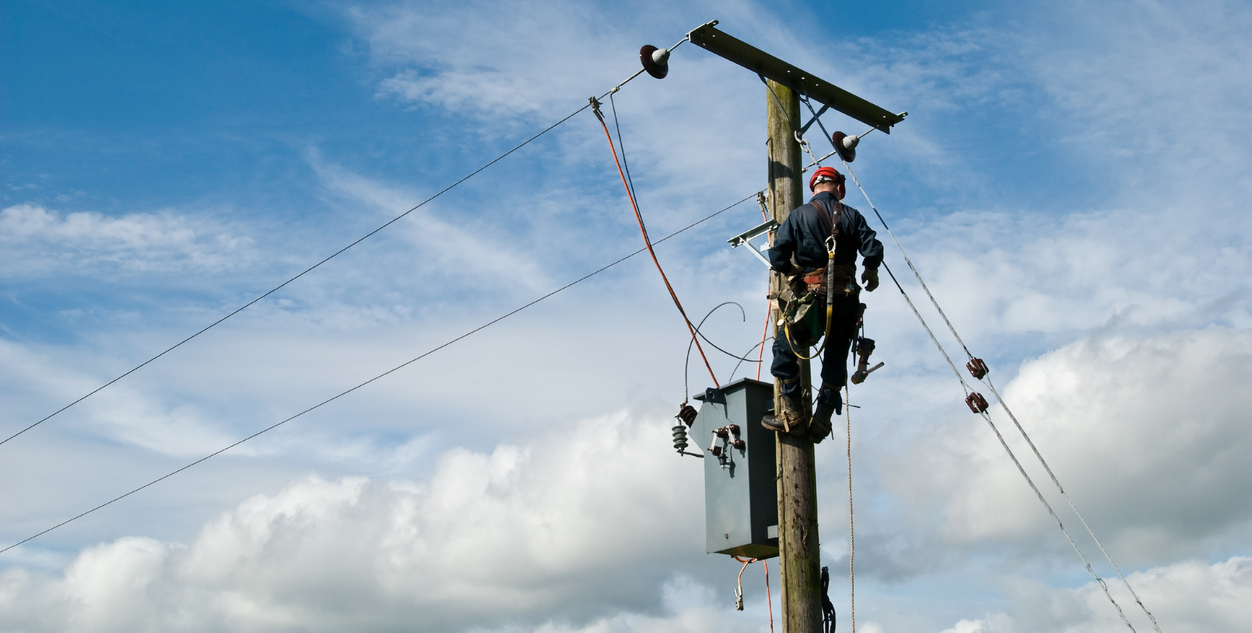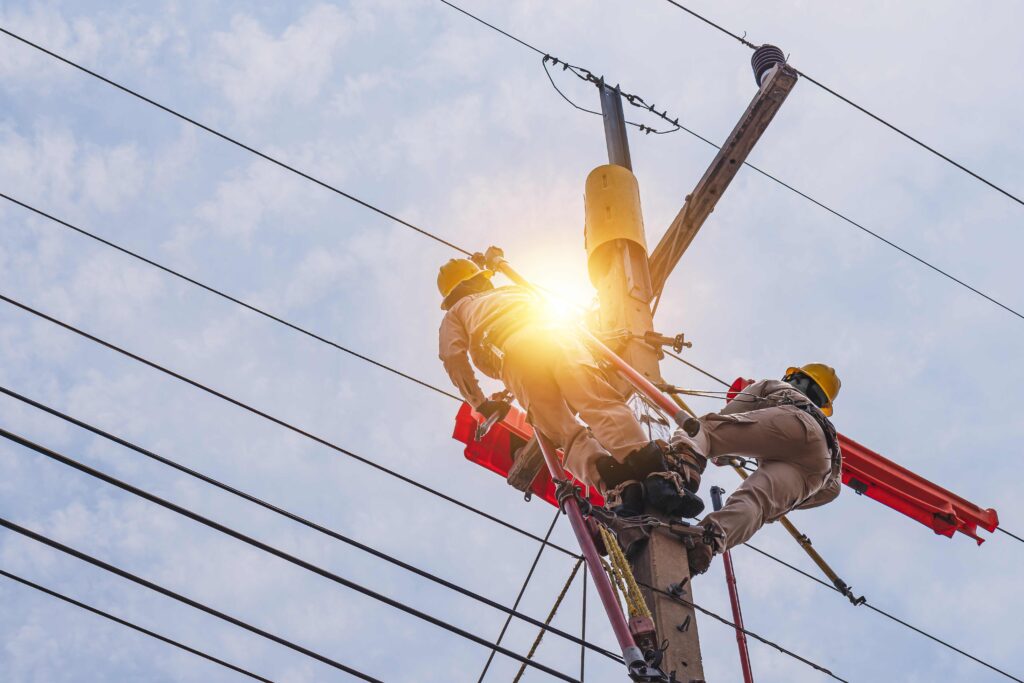A Powerline Worker maintains and repairs electrical power systems. This job involves high-risk tasks such as climbing poles and handling live wires.
Powerline workers, also known as linemen, are the professionals who install, maintain, and repair electricity distribution and transmission networks. They play a crucial role in ensuring the uninterrupted supply of electricity to homes, businesses, and industries. Their responsibilities include setting up poles, stringing lines, and installing transformers and other equipment necessary for electricity delivery.
These skilled tradespeople often work outdoors in all weather conditions and must follow strict safety regulations to protect themselves and the community. With the increasing demand for electricity and the aging infrastructure, the role of powerline workers is more significant than ever, making it a vital and demanding profession.

Credit: www.youtube.com
The Role Of A Powerline Worker
Imagine a world where the lights always stay on. That’s a world powered by the unsung heroes of our communities – powerline workers. These skilled professionals are critical to keeping our homes illuminated, our businesses running, and our streets safe at night. But what exactly does their role entail? Let’s climb the utility pole of knowledge and uncover the electrifying world of a powerline worker.
Job Description
Powerline workers maintain and repair the cables or wires used in electrical power or distribution systems. They ensure that electricity flows reliably from power plants to homes, businesses, and public spaces. Their job is essential for the sustenance of modern life.
Responsibilities
- Inspect and maintain power lines and auxiliary equipment.
- Install and repair electrical power systems and ensure their functionality.
- Adhere to safety regulations to protect themselves and the community.
- Respond to emergencies and outages promptly and efficiently.
- Use a variety of tools and equipment to manage electrical components.
Work Environment
Powerline workers often find themselves high above the ground, working atop poles and towers. Their environment can be challenging as they brave the elements, from scorching sun to icy storms, to keep the lights on. Teams commonly work together, fostering a culture of camaraderie and support amid physically demanding conditions. Their dedication shines through, ensuring communities remain connected and energized.
Training And Education
Choosing a career as a Powerline Worker means ensuring communities have essential power. The journey starts with the right training and education.
High School Diploma Or Equivalent
A high school diploma or its equivalent is the foundation. Subjects like math and physics are crucial. They help in understanding the basics of electrical systems.
Apprenticeship Program
Learning the ropes as a Powerline Worker requires hands-on experience. An apprenticeship program provides this. It combines classroom learning with fieldwork. Future Powerline Workers spend several years under the guidance of experienced professionals. Skills like climbing poles, installing lines, and understanding safety protocols are taught. Here are key features of an apprenticeship:
- Duration: Typically 3-4 years
- On-the-job training: 6,000-8,000 hours
- Classroom instruction: 144 hours each year
- Earnings: Paid work with seasoned mentors
Certification And Licensing
After apprenticeship, workers may need certification and licensing. Requirements vary by state or country. Certification proves expertise in the field. It may help in landing a job. Licensing may involve passing an exam. It shows that a worker knows the local electrical codes and safety regulations.
| Certification | Licensing |
|---|---|
| Proof of skill level | Knowledge of laws and regulations |
| May boost job prospects | Often requires examination |
Skills And Qualities
Powerline workers are the unsung heroes who keep our lights on and businesses running. These skilled professionals work tirelessly, often in challenging conditions, to maintain and repair the electrical power grid. To succeed in this field, a powerline worker must possess a unique set of skills and qualities. Let’s explore some of the core attributes that contribute to their role.
Physical Strength And Stamina
Working on power lines is physically demanding. Powerline workers often carry heavy equipment and tools. They climb tall poles and work in all weather conditions. Endurance and physical resilience are crucial. Here are some physical abilities they need:
- Above-average physical strength to handle heavy tools and materials
- Good hand-eye coordination for precision tasks at heights
- Stamina to endure long hours, often in extreme conditions
Technical Skills
Technical know-how is core to a powerline worker’s job. These professionals work with complex electrical systems. Training and continuous learning keep their skills sharp. Safety protocols are critical knowledge areas. They also require:
| Technical Knowledge | Application |
|---|---|
| Electrical theories | Understanding how electricity works |
| Equipment proficiency | Operating tools and machinery effectively |
| Regulatory compliance | Adhering to laws and safety standards |
Problem-solving Abilities
Unexpected challenges are common in the field. Powerline workers solve complex issues quickly and effectively. Critical thinking and decision-making are key. They often rely on:
- Assessing situations rapidly and with a keen eye for detail
- Identifying the root cause of power outages or electrical faults
- Implementing solutions that restore power safely and efficiently
Safety Protocols
Safety is the backbone of powerline work. It stands between a regular day and potential danger. Powerline workers follow strict safety protocols to protect their lives and those around them. Let’s dive into the crucial safety measures they adhere to every day.
Adherence To Osha Regulations
Fulfilling OSHA guidelines is not an option but a necessity for powerline workers. The Occupational Safety and Health Administration (OSHA) sets the standards, and compliance reduces risks.
- Regulatory Training: Workers receive training on OSHA standards.
- Job Site Analysis: Before starting, a risk assessment is done.
- Periodic Reviews: OSHA compliance is reviewed and updated regularly.
Use Of Personal Protective Equipment (ppe)
Every powerline worker must wear PPE to shield themselves from hazards. It includes hard hats, gloves, safety glasses, and more.
| PPE Item | Function |
|---|---|
| Hard Hats | Protects the head |
| Gloves | Insulates the hands |
| Safety Glasses | Guards the eyes |
Emergency Response Training
Prepared for the unexpected, powerline workers undergo extensive emergency training. They learn how to respond swiftly and effectively.
- First Aid Certification
- Rescue Techniques Training
- Disaster Simulation Drills
Career Advancement
Building a career as a Powerline Worker offers diverse pathways to grow professionally. Workers in this field can move up to more complex roles over time. Let’s explore the routes one can take to advance in this energizing career.
Specialization In Advanced Techniques
Advanced techniques in Powerline work open doors to many opportunities. Gaining expertise in these areas can set you apart:
- High Voltage Live Line methods
- Smart Grid Technology implementation
- Helicopter Line Work for remote locations
Workers with these skills take on complex projects. They often lead teams on specialized tasks.
Supervisory And Management Roles
Leadership positions are crucial for the safety and efficiency of powerline projects. Consider these possible steps towards supervisory and management roles:
- Lead Hand: Direct a small crew, mentor trainees.
- Foreman: Oversee daily operations, ensure safety protocols.
- Operations Manager: Manage larger projects, coordinate multiple teams.
Each step up comes with greater responsibility. It also brings more influence over project outcomes.
Continuing Education
Continuous learning keeps Powerline Workers at the forefront of the industry. Opportunities for education include:
- Technical certifications
- Industry conferences
- Online courses in emerging technologies
Those who invest in learning stay ahead. They also enjoy a wider array of job options.
Challenges And Rewards
Have you ever wondered who ensures your lights come back on during a storm? Powerline workers brave the elements and overcome numerous challenges to keep our societies powered. Let’s shed some light on the rigor and rewards these unsung heroes face every day.
Working In Adverse Weather Conditions
Powerline workers often battle extreme weather to restore electricity. Their dedication shines through as they take on:
- Blizzards: Cold winds and snow challenge their resilience.
- Storms: They stand firm against lashing rain and thunder.
- Heatwaves: Scorching sun adds to the on-field endurance test.
Satisfaction In Providing Essential Services
Despite the hardships, these workers take pride in their critical role. They are the backbone that keeps the community running by:
- Maintaining the electric grid.
- Ensuring uninterrupted power supply.
- Bringing light and warmth to homes.
Potential Risks And Hazards
Each day presents potential dangers that powerline workers must navigate, such as:
| Hazard | Prevention |
|---|---|
| Electrical Shocks | Strict adherence to safety protocols |
| Falls from Heights | Use of harnesses and safety equipment |
| Debris and Obstructions | Clear work areas and vigilant situational awareness |
Industry Outlook
The future shines brightly for powerline workers. This vital sector promises stability and growth. Energy needs increase as populations expand. Powerline workers remain essential in keeping the lights on and industries running. Their role cannot be overstated. Let’s explore the future prospects in this dynamic field.
Demand For Skilled Powerline Workers
Electricity powers our lives. So, we need more people to work on power lines. Cities grow bigger. More homes and businesses mean more power lines. This need makes sure that skilled powerline workers are always in demand. Schools and training programs are key. They help prepare the next wave of talent.
- Robust infrastructure projects
- Renewable energy expansion
- Replacement of retiring staff
Technological Advancements Impacting The Field
Technology changes fast.Powerline work is no exception. Drones and robots now help in this field. They can check lines and fix problems. This means safer working conditions. Workers must learn these new tools. It keeps them ready for the future.
| Technological Tool | Benefit |
|---|---|
| Smart Drones | Line inspection |
| Robotic Arms | Repairs in hard places |
Potential Job Growth
The job outlook for powerline workers is positive. More growth is expected in the coming years. This growth comes from older lines needing upgrades. Also, green energy solutions need more grid connections. Let’s not forget extreme weather repairs. All these factors create more jobs for powerline workers.
- New powerline installations
- Grid modernization projects
- Increase in storm and disaster recovery efforts

Credit: www.arnolditkin.com
Frequently Asked Questions
What Are People Who Work On Power Lines Called?
People who work on power lines are commonly known as linemen or line workers. These professionals install and maintain electrical power systems.
What Is An Electrical Line Worker?
An electrical line worker installs and repairs cables or wires used in electrical power or distribution systems. They ensure that electricity flows from power plants to houses and businesses safely and efficiently.
What Is The Difference Between A Line Worker And An Electrician?
A line worker, often called a lineman, specializes in installing and repairing outdoor electrical lines. An electrician works on a broader range of electrical systems within buildings, including installation, maintenance, and repair of wiring and electrical fixtures.
What Does Lineman Do?
A lineman installs and maintains electrical power and telecommunications lines. They repair wires and troubleshoot outages to ensure reliable utility services.
Conclusion
Powerline workers truly are the unsung heroes of our modern infrastructure. Their dedication ensures our daily lives remain illuminated and powered. With each climb, they bridge the gap between darkness and light. Remember their role; next time you flip a switch, you’re witnessing their handiwork.
Stay safe up there, linemen!


